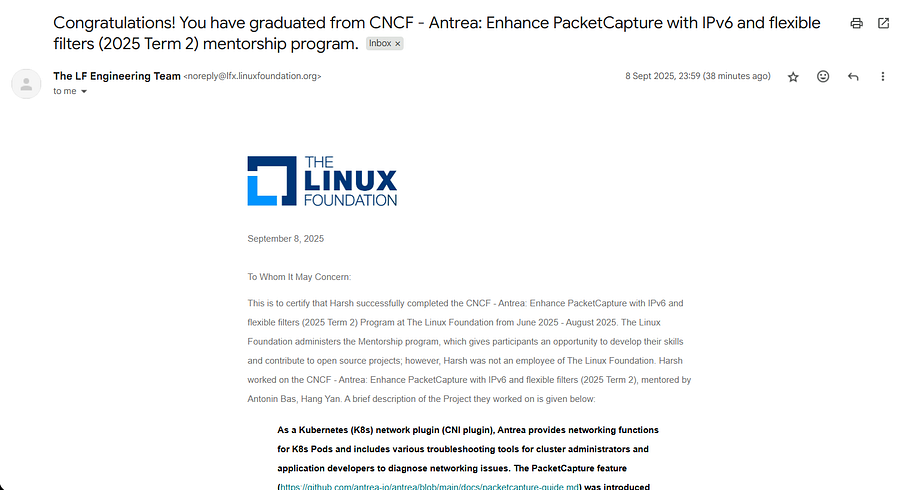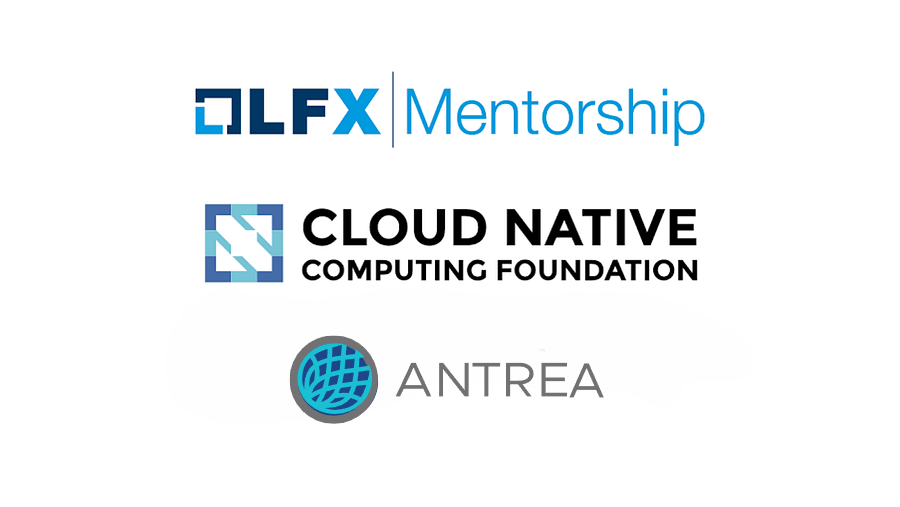LFX Mentorship
The results for the LFX Mentorship were scheduled to be announced on June 4, 2025. I didn’t receive any email that day (timezone ;), so I waited, restless and full of anticipation. That night, my mind was filled with thoughts about the mentorship.
The next morning, I woke up earlier than usual. Lying in bed, I opened my email, bracing myself for disappointment. And there it was a rejection mail… or so I thought. But the universe had a different plan.
Instead of rejection, I found an acceptance mail waiting for me. In that moment, my heart raced with joy. Words can’t truly capture how happy I felt.

So, What is LFX Mentorship?
The LFX Mentorship program is a remote learning opportunity for open source contributors who work for 12 weeks under the guidance of mentors who are maintainers and developers of a particular project and help the mentees to contribute to the community and project.
This mentorship program is organized three times a year, i.e., Spring, Summer, and Fall months.
Please have a look at the Mentorship guide to learn how to participate in LFX Mentorship programs: https://docs.linuxfoundation.org/lfx/mentorship
Background
I am a member of my college’s cybersecurity club, InfoSecIITR at IIT Roorkee. A few of my fellow club members had previously been selected for the LFX Mentorship, which inspired me to give it a try. After facing rejection in GSoC 2025, I started exploring opportunities with the LFX Mentorship.
Coincidentally, the application period had just begun right after my semester exams, so the timing couldn’t have been better. With my background in Computer Networking, Cloud Native technologies, and Golang development, I found the Antrea project to be the perfect fit for Term 2.
What is Antrea?
The Antrea Project is an open-source Kubernetes networking project under the Cloud Native Computing Foundation (CNCF) Sandbox. It provides a Kubernetes-native networking solution built on top of Open vSwitch (OVS) to deliver high-performance, secure, and flexible connectivity between pods, services, and external networks. Antrea implements the Container Network Interface (CNI) and supports advanced features like NetworkPolicies, Multi-cluster connectivity, ClusterIP/LoadBalancer services, traffic encryption, Network Flow visibility, and NetworkPolicy audit logs. It is designed for cross-platform compatibility (Linux and Windows) and integrates seamlessly with existing Kubernetes tools. Antrea also enables observability and troubleshooting through packet capture, flow export, and diagnostics. Overall, it aims to provide enterprises with production-grade networking and security for modern cloud-native workloads.
Application Process
To begin with, I started exploring the Antrea codebase and hunting for Good First Issues. In the process, I managed to push four pull requests even before submitting my application, which not only improved my understanding of the project but also gave me the confidence to engage deeper.
Every LFX project usually comes with an assignment or task that must be completed along with the application. For Antrea, the task was directly related to the work planned for Term 2. I prioritized completing it early, which further strengthened my confidence and gave me solid material to highlight in my cover letter.
When the time came, I submitted my resume and cover letter. But my journey didn’t stop there, I kept contributing and continued interacting with mentors on Slack. Even if I hadn’t been selected, I would still have meaningful contributions to open source and valuable learnings in Cloud Native technologies to carry forward.
My Mentorship Journey
First of all, I want to sincerely thank my mentors Antonin Bas and Hang Yan for believing in me and guiding me throughout this journey.
The mentorship began with an introduction meeting in the very first week, where my mentors walked me through the broader vision of the project and the steps required to achieve it. From the beginning, they made it clear that support was always available, not just during our weekly sync-up meetings, but also anytime on Slack if I faced roadblocks. This open communication culture was a huge relief and motivated me to push myself harder.
I quickly realized that in a remote, global collaboration environment, the most important skill is clear communication. It helps avoid misunderstandings, makes expectations transparent, and ensures progress is consistent. My mentors always encouraged me to ask questions, seek clarifications, and share updates openly. This not only helped me overcome technical challenges but also taught me the professional value of collaboration.
You can find my project details here:
What I Worked On
During the mentorship, I contributed to Antrea’s PacketCapture feature, focusing on enhancing its flexibility and real-world usability. My contributions revolved around three major improvements:
IPv6 Support (#6861): Extended the existing IPv4-only PacketCapture functionality to support IPv6 packets, enabling comprehensive traffic capture in modern dual-stack Kubernetes environments.
Arbitrary Source/Destination (#6976): Removed the limitation that required specifying both source and destination. With this enhancement, users can now capture all traffic from/to a single Pod, greatly simplifying debugging and monitoring.
Capture Point Selection (#6863): Introduced the ability to specify capture points (either source or destination), making it possible to perform differential analysis and gain deeper insights into network traffic flows.
Technical Skills Utilized
This project gave me hands-on experience with:
- Golang - implementing new features, following code conventions, and writing unit tests
- Kubernetes Architecture & APIs - working with CRDs and controllers
- Networking Protocols - deep dive into IP, TCP, UDP, ICMP
- Go Testing Framework - ensuring reliability and preventing regressions
- BPF (Berkeley Packet Filter) - for traffic capture and filtering logic
- KinD Clusters - for local testing and validation
Without the continuous support of my mentors, I wouldn’t have been able to grasp so many concepts like API design conventions, CRD schema updates, CLI tool, BPF internals, handling breaking changes, and structured testing practices, all in such a short span of time.
Conclusion

Looking back, this mentorship has been one of the most transformative experiences of my journey as a developer. I deepened my technical expertise in Kubernetes networking, Golang, and BPF, but equally important, I learned the value of clear communication, consistent collaboration, and open-source community spirit.
What I value most is that this program goes beyond just coding - it blends mentorship, financial support, and real-world open-source experience, giving contributors a safe yet challenging environment to grow. It is a platform where you don’t just learn - you become part of the open-source ecosystem, building something that people across the world will use.
This mentorship has solidified my passion for Open source and Cloud Native technologies, and I look forward to continuing my contributions to projects in these domains.
I would like to express my gratitude to my mentor Antonin Bas and Hang Yan for being such amazing support throughout the project. Heartfelt thanks to the LFX, Antrea, CNCF and Kubernetes community as well without whom neither this project nor this program could have been possible.
For anyone reading this - whether you are just starting out or already have some prior experience - I highly encourage you to apply for the LFX Mentorship. It will challenge you, teach you, and most importantly, make you grow as both a developer and a contributor to meaningful, impactful projects.
✨ Open source isn’t just about code - it’s about community, collaboration, and contribution. And through this mentorship, I got to experience all three in the best way possible.

